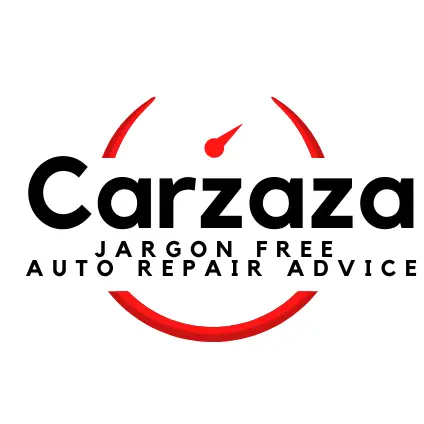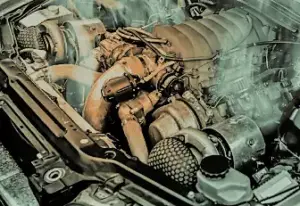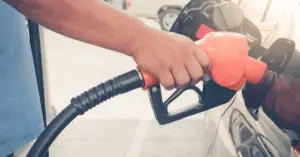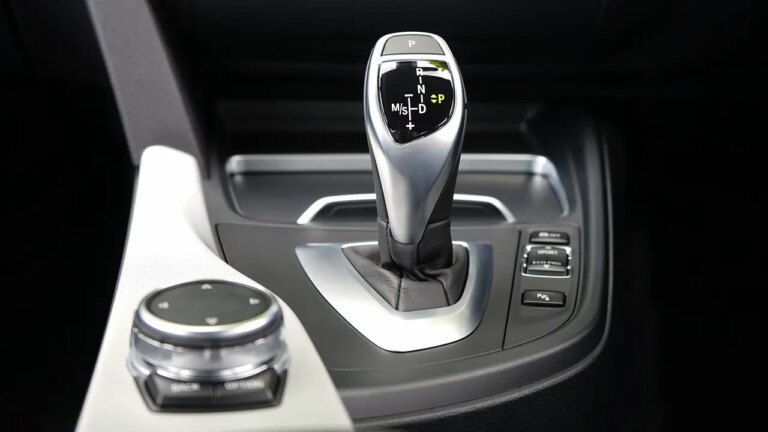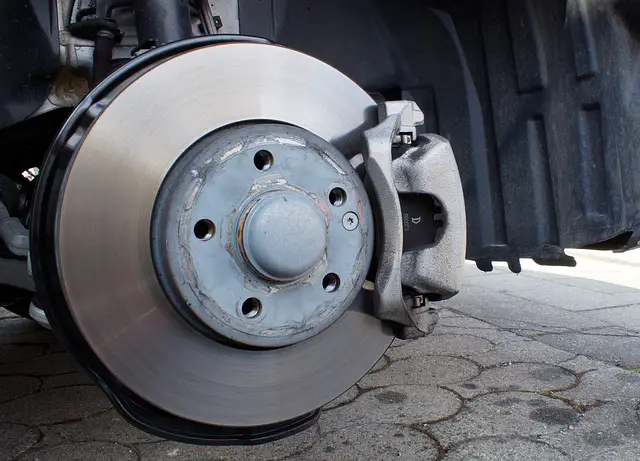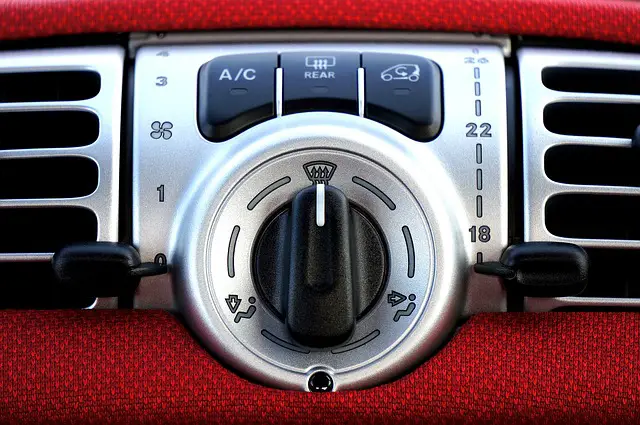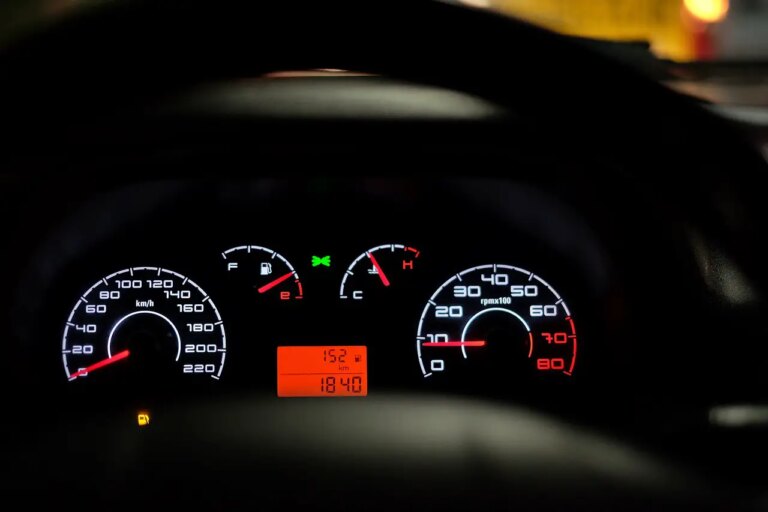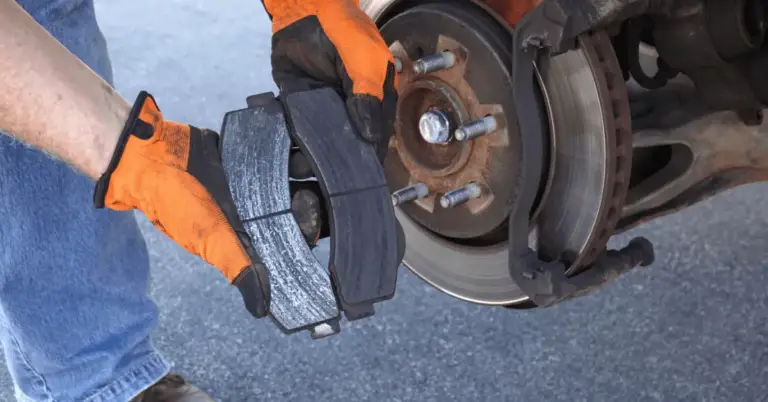There are eight reasons why your car is slow to accelerate. We’ll examine the reasons, costs of repair, if the symptoms will worsen, and if you can repair the fault yourself.
Generally, the most likely cause is a dirty air filter or a clogged fuel line. When your air filter is dirty, not enough air can pass to the combustion chamber of your engine. When the fuel line is blocked, the engine can’t get the gas it needs.
1. Air Filter
Your air filter will be found in a box in the engine bay. The filter catches dust and other particles before the air is allowed into the engine. If they aren’t replaced regularly, they clog up.
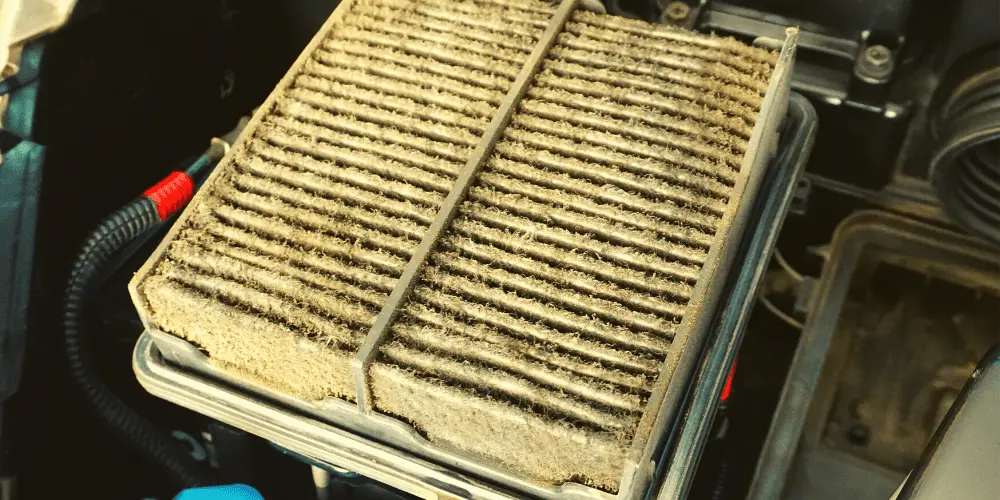
If this happens, not enough air can pass through the filter into the engine. This results in a slower pick-up when you press the accelerator pedal.
Will it get worse?
Yes, the air filter will become more clogged, and the car’s performance will deteriorate.
What is the cost of replacing the air filter?
Air Filters cost $15 – $30 plus labor costs of $40 – $75 to replace depending on the make of your car and the brand and quality of the air filter being fitted.
Can I replace an air filter myself?
Yes, this is a simple job. Under the hood, look for a box approximately 12″ x 6″, fastened by a couple of clips or screws.
Open it up, remove the old filter and replace it with a new one.
2. Spark Plugs
Spark plugs are precision items in your car’s engine that produce sparks. These sparks ignite the fuel and air mixture that makes your car drive. If the spark plug(s) become corroded or clogged up, they can stop producing the sparks your engine needs.
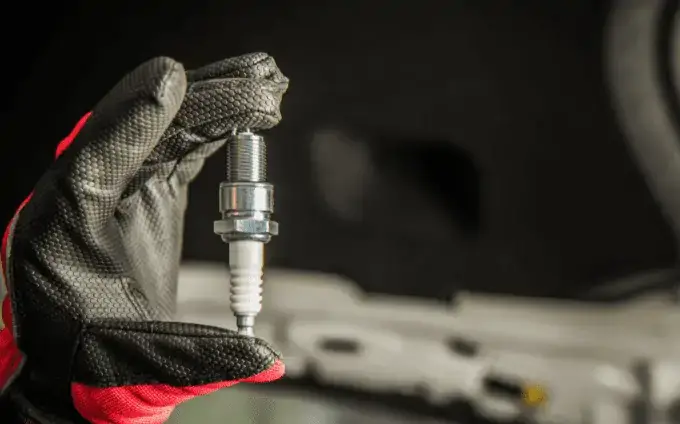
When accelerating, your engine demands more sparks from your plugs, which cannot provide enough when clogged. Most cars have four cylinders, and a spark plug is fitted to each one.
Will it get worse?
Yes. Spark Plugs are not self-cleaning and will require cleaning or replacing.
What is the cost of replacing spark plugs?
It makes sense to replace all the spark plugs at the same time. A set of four spark plugs cost between $50 and $95. Labor fitting costs are approximately $150.
Can I replace the spark plugs myself?
Unless you have some basic tools, then no. If you have a gap gauge, pliers, a torques wrench, a ratchet, and an hour of free time, you could change your spark plugs.
3. Car Exhaust System
Your car needs all parts to perform well. If your car can’t get rid of the waste material – exhaust fumes- it disrupts the cycle of burning fuel in your engine and causes sluggish performance.
The two main parts of your exhaust which can cause poor acceleration are
- The oxygen sensor measures the amount of oxygen in your exhaust, which can give false readings to your car’s computer (ECU). There can be up to 4 of these sensors per vehicle. A bad sensor reading can make your car run rich.
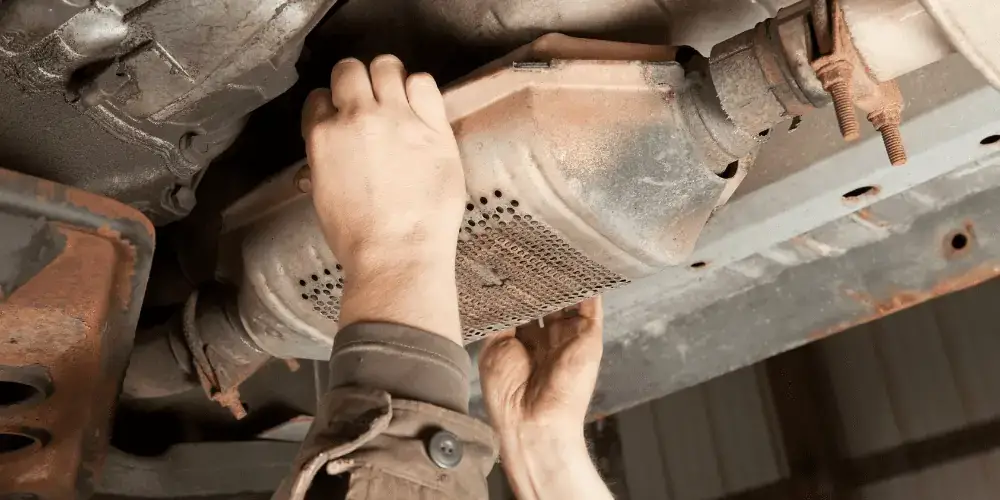
- Catalytic Converter – an expensive part that can become clogged – should regenerate itself (self-clean) but is prone to fail after 70,000 miles.
Will it get worse?
Yes, once these two parts fail, they won’t repair themselves. A catalytic converter will become more clogged and can cause the car to go into limp-home mode. This is a safety feature designed to protect the engine from further damage.
What is the cost of replacing an oxygen sensor?
The average cost of an oxygen sensor replacement is $350. The part costs between $150 – $225, and labor costs are between $100 and $175. You shouldn’t pay more than $300 to get the oxygen sensor replaced on a standard vehicle.
What is the cost of replacing a catalytic converter?
A new fitted catalytic converter costs between $900 and $2,500, including labor. The part itself costs between $700 and $2,300.
Can I replace my car’s oxygen sensor myself?
The replacement isn’t the difficult part. The difficulty is knowing if the oxygen sensor is faulty and, if so, which one needs replacing. This is a job for the car shop.
Can I replace my car’s catalytic Converter myself?
It’s possible, but the part is often welded on, which makes it very difficult to get off without specialist tools.
4. Throttle Position Sensor
Another sensor that can go bad is the TPS. It’s a sensitive piece of equipment that tells the ECU (the car’s computer) what demands are being placed on the engine via the accelerator pedal.
If it gives the ECU a wrong reading, it will result in slow acceleration and sluggish starts.
Will it get worse?
It may not get worse immediately, but the readings it gives the ECU may become more haphazard over time. It won’t manage to repair itself, unfortunately.
What is the cost of replacing a Throttle position sensor (TPS)?
Expect to pay between $100 to $150 for the part and another $50 in labor costs. In total, expect to pay on average $175 for a new fitted TPS.
Can I replace my car’s throttle position sensor myself?
This is one of the easier parts to replace yourself. There is no need to get underneath the car, and the old part can be removed quickly by undoing a couple of clips.
The battery should always be disconnected before changing it over.
The problem comes with identifying the TPS as the cause of the poor acceleration in the first place.
5. Vacuum Hoses Leak
As you’ve seen already, many acceleration issues are caused by a lack of air or fuel in the engine.
A common cause of insufficient air being available for the engine is a leak in the hoses.
Often, you’ll be able to hear a high-pitched hissing noise if you open the hood and get your ear down close.
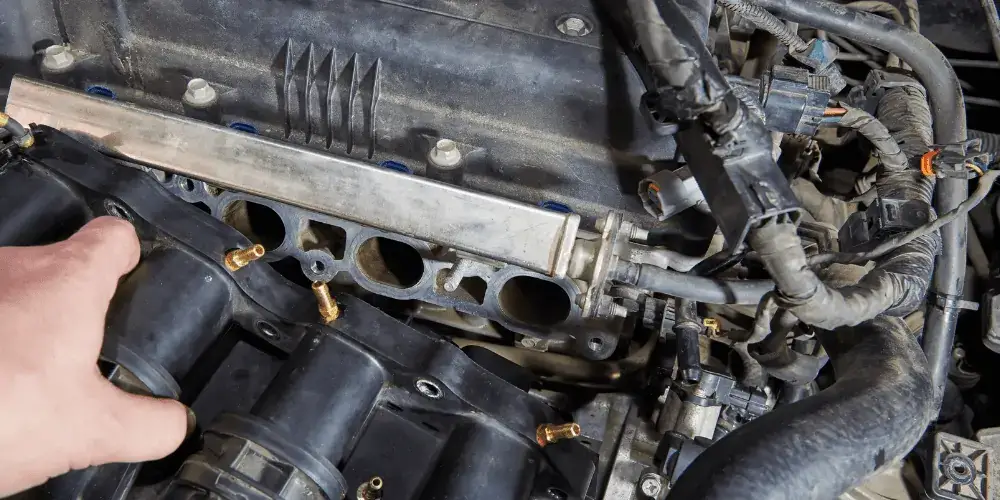
If you hear it, you can spray water around the intake manifolds and listen for changes in engine tone. When/if you hear it, that’s where the leak is.
Will a vacuum leak get worse?
It may take months for the situation to worsen, but eventually, the hole will get bigger and more air will escape.
Cost of repairing leaking vacuum hoses?
$20 – $40 for the replacement hose and $50 in labor. This is a cheap fix. A car shop will be able to replace the faulty hose in next to no time.
Can I replace my air hoses myself?
Sure. Once you’ve located the faulty hose, replace it. No special tools or knowledge are needed.
6. Car Ignition Coil
This part is closely linked to the spark plugs. Now, the spark plugs deliver the sparks to the gas and air mix, but the ignition coil supplies the volts to allow the formation of the sparks in the first place.
Ignition coils have a lifespan of over 100,000 miles, so unless your car has this amount of miles on the odometer, it’s unlikely to cause the problem.
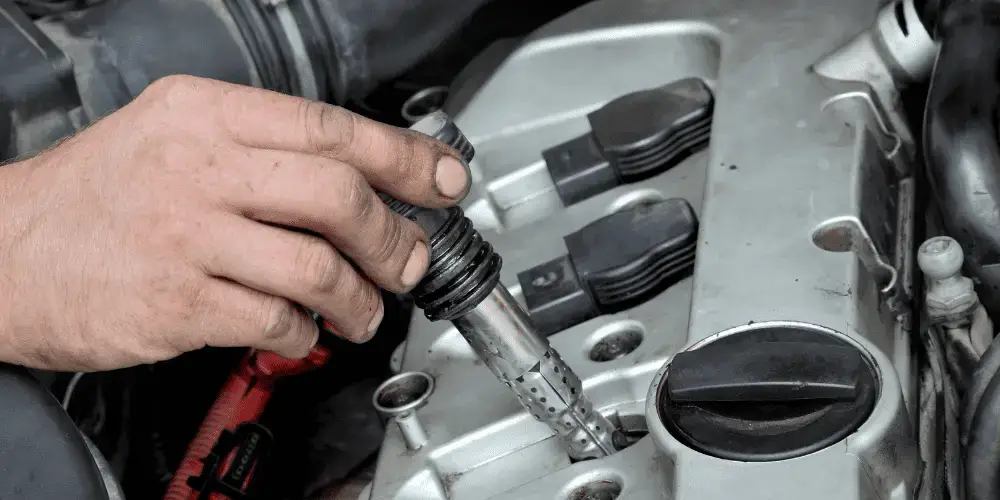
Will it get worse?
Unfortunately, it won’t fix itself like all of the potential reasons we have looked at so far. It’ll need to be replaced as it will eventually deteriorate to the point where it won’t generate the voltage needed to spark the car into life.
Most modern cars have four ignition coils, as they need one for each spark plug. You can replace just one, but often, the other will fail soon after the first. If you have the budget, replace all four at the same time.
What does an Ignition coil cost to replace?
A single ignition coil replacement costs between $80 and $300, depending on the make of the car. The part costs between $50 and $125, and labor costs between $50 and $175.
Can I replace the ignition coils myself?
You don’t need specialist tools – a basic tool kit will do – but you’ll need a multimeter to test which one is defective.
Make sure you disconnect the battery first, too.
7. Transmission Problems
The transmission and drivetrain are, to put it simply, the gearbox. Sometimes – when the more common faults have been checked and found not to be the reason – the transmission can be at fault. If the car can’t move out of a low gear into a higher gear, acceleration will be poor.
You may notice an increase in revs and hear the engine working harder than it should.
Will it get worse?
It may not get worse, but it won’t get any better. You could cause additional damage to your transmission by continuing to drive. It’s best to stop and call a mechanic.
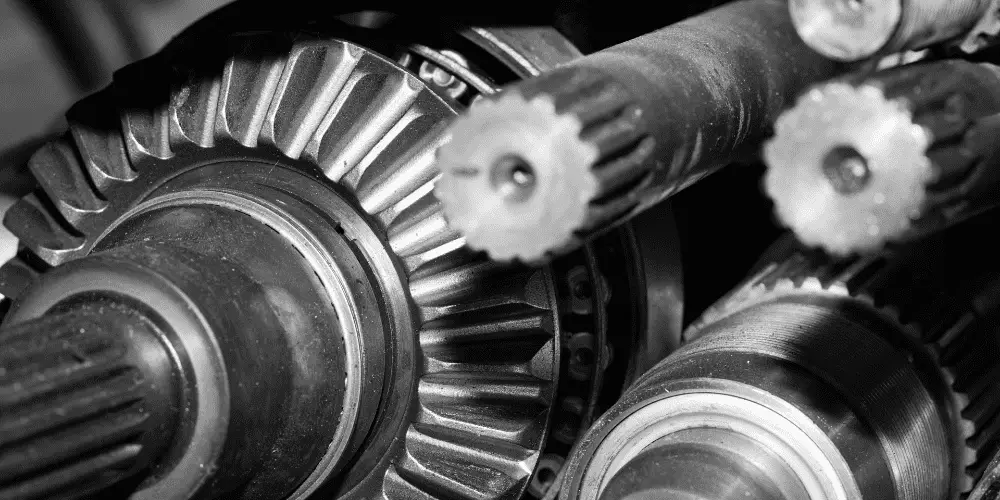
How much will it cost?
I’m afraid you’ll be looking at a substantial bill. The transmission is a precise piece of machinery. There are so many moving parts in a gearbox that it’s impossible to give an estimate of the likely repair costs.
With some older cars, the repair cost doesn’t make economic sense. If this happens, it may be time to scrap the car.
Can I repair the transmission myself?
No, is the simple answer. Many car shops won’t even attempt to repair transmissions preferring to send them away to be evaluated and repaired if possible.
8. Low Engine Compression
An engine works under very high pressure, and any reduction in this can lead to sluggish acceleration. The pressure leak normally happens when a cylinder seal blows, causing a decompression. However, leaky intake valves are another common culprit.
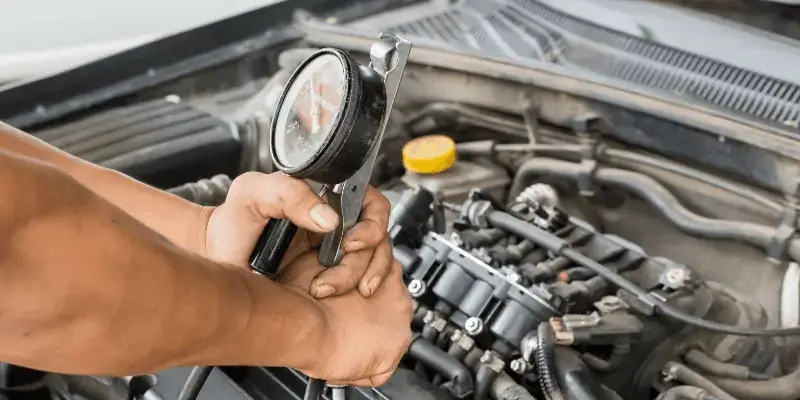
Will it get worse?
Yes, the compression will lessen and sometimes very quickly too. Don’t drive the car and get it inspected right away. You could do extensive damage to your engine if other parts fail.
How much will it cost?
To repair low compression in one cylinder costs between $200 and $300. If additional damage to the engine, expect to pay between $1,000 and $2,500, including parts and labor.
Can I fix low compression on my cylinders myself?
No. This is a job for a qualified and experienced mechanic. The valves and pistons must work to precise timings, and even the slightest mistiming can lead to the engine seizing.
In conclusion
If your car is slow to accelerate this points to worn and carbon encrusted spark plugs. The harder the acceleration the more sparks are needed. Worn spark plugs can’t provide this. The check engine light may also come on.
